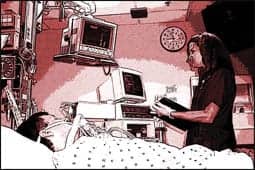A specific, rare genetic mutation can identify which patients are more likely to suffer from severe respiratory infections and lung damage, according to the results of a study led by the University of Cambridge.
In looking at genetic information from individuals who suffer from immunodeficiency and are predisposed to infections, researchers found a unique genetic mutation in 17 patients suffering from severe respiratory infections. The mutation increases activity of an enzyme called Phosphoinositide 3-Kinase ? (PI3K?), which is present in and regulates the function of immune cells.
When constantly activated, however, PI3K? impairs work of these immune cells, preventing them from responding efficiently to infection and providing long-lasting protection. Consequently, patients with this mutation have severe and recurrent infections.
“Patients with this mutation have a defect in the immune cells, so their protection from infections is weak and inefficient,” said Sergey Nejentsev, Wellcome Trust Senior Research Fellow from the University of Cambridge who led the research. “We called this newly identified disease Activated PI3K- ? Syndrome (APDS) after the enzyme in the immune system that is affected by the genetic mutation.”
The team believes drugs in clinical trials for leukemia specifically designed to inhibit the PI3K? enzyme could successfully treat APDS.









